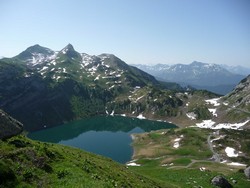The impact of climate change on groundwater resources
Karst aquifers are a kind of bedrock with springs that can be used for drinking water supply. Made up of networks of caves or conduits, karst aquifers supply 25 % of the global population with drinking water. However, their hydrogeological characteristics also make them especially vulnerable to contamination. The EU-funded IMKA (Impact of hydrological extremes on alpine karst groundwater resources) initiative studied whether climate change-induced weather extremes will affect contamination of karst groundwater. Since alpine regions rely heavily on karst groundwater for their water supply. IMKA used a site in the Austrian Alps to predict contamination risks. The project monitored spring discharge and water quality while also measuring parameters such as rainfall, turbidity, total organic carbon and particle size distribution. Their measurements, which also included microbial sampling at selected karst springs, showed that karst aquifers are highly vulnerable to microbial pollution. Indeed, none of the tested springs satisfied legal drinking water safety requirements. IMKA monitored the springs in more detail to identify links between physical and microbiological factors as indicators for faecal contamination. They found that fluorescence measurements can be used to determine organic substances in karst spring waters and act as an early warning system for faecal contamination. This study showed that groundwater protection zones are not effective, and indicates that current water safety guidelines should be re-evaluated. Variable hydrological conditions, particularly those caused by climate change, need to be considered to preserve karst water as a future drinking water source.
Keywords
Climate change, groundwater contamination, karst aquifers, drinking water, IMKA

